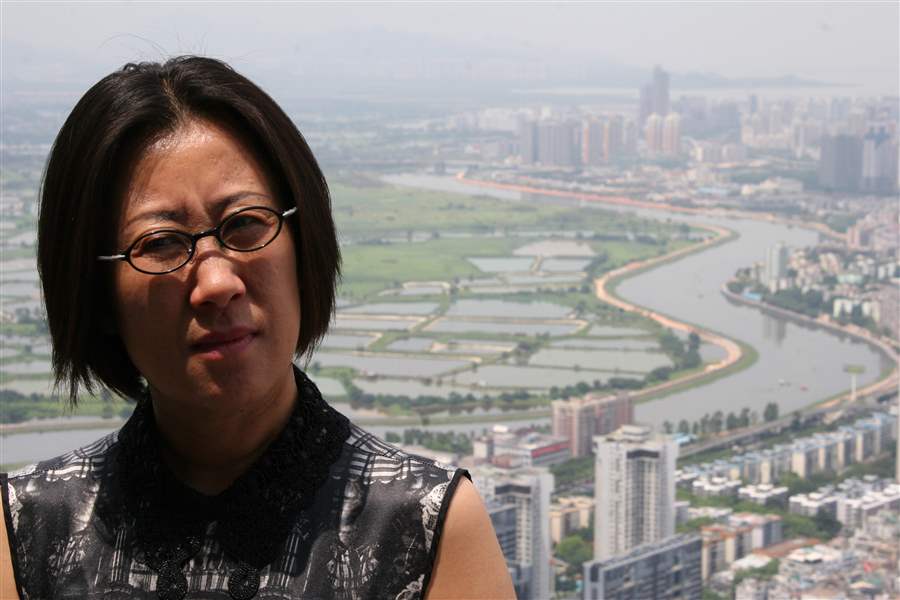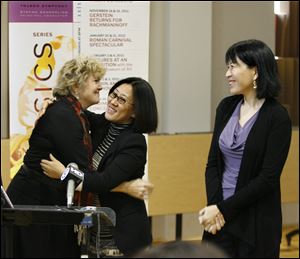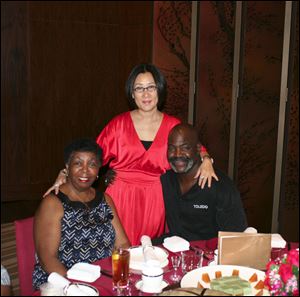
Last of three parts
Dashing Pacific's Yuan succeeded in tech field
2/21/2012
Yuan Xiaohong in Shenzhan, China.
The Blade
Buy This Image

Yuan Xiaohong in Shenzhan, China.
Dashing Pacific Group Chairman Yuan Xiaohong in November spent 14 hours in the air, hit the ground at Detroit Metro, and made her way to Toledo. The first order of business was to see “Mamma” and “Papa.”
It was actually Norman and Ora Bell — the parents of Toledo Mayor Mike Bell — whom the Chinese business executive wanted to spend time with before doing anything else, including checking out her multimillion-dollar real estate investments along the Maumee River.
“She loves my parents,” Mr. Bell said.
The mayor describes her as family-loving, outgoing, and a successful woman. But among her subordinates in China, Ms. Yuan has a harsher reputation — more like that of an “Iron Lady,” as one of her employees called her. And then there is her Dashing Pacific partner, Wu Kin Hung. He also has a reputation in China. He has flown under the radar in China but is known to be a successful businessman who got his start using his ties to the ruling Chinese Communist Party to become a governmental bureaucrat in the coastal Chinese city of Shenzhen.
A message from the Publisher and Editor In Chief
Months before the Marina District deal was closed, during Mr. Bell’s second trip to China in May, he and Ms. Yuan were constantly together. As the mayor and Regional Growth Partnership Chief Executive Dean Monske arrived at the Beijing airport for a flight to Hangzhou in Zhejiang Province, they found Ms. Yuan and translator/deal broker Simon Guo waiting to join them on the flight

Amy Chang, right, watches as Kathy Carroll, president and CEO of the Toledo Symphony, embraces Yuan Xiaohong of the Dashing Pacific Group, following an announcement that they would sponsor a trip to China for the Toledo Symphony.
It was during that two-hour flight that Ms. Yuan sat next to the mayor and agreed to reoffer Dashing Pacific’s $3.8 million bid to buy 69 acres of Marina District property. That was after having withdrawn from the deal over a flap with Toledo City Council.
Mr. Bell says interactions with Ms. Yuan — such as the nine days he spent in China, much of it with her in May — are all the proof he needs that she and Mr. Wu are good partners for the city of Toledo.
“I look at them as some of my best friends of international origin,” the mayor said.
Background check
From the beginning, when Mr. Bell announced this newfound relationship, he said he was not going to dig into the Chinese investors’ backgrounds the way former mayors had done for previous Marina District developers, and he said he was unconcerned where their money came from.
READ MORE: Toledo's China Connection
A China-based company hired by The Blade to look into the investors’ backgrounds discovered intriguing information about Ms. Yuan and Mr. Wu.
Investigators said Ms. Yuan, like many successful business leaders in China, used her connections with government officials to win contracts for the information technology company she runs. Her most prominent business deal is an information system integration project in Inner Mongolia, not property or land development like Mr. Wu.
Over the past year, Ms. Yuan, an Inner Mongolia native and Shenzhen business executive, developed close ties with Mr. Bell and was quick to close a major land purchase with the city of Toledo.
The owner of the investigating firm hired by The Blade, whom the newspaper has decided not to identify because of concerns about government retaliation, said parts of Ms. Yuan’s background were shrouded in mystery.
“Our work on Yuan is … still ongoing,” he wrote in an email from China before the month-long investigation was complete. “We ran into some unexpected obstacles.”

Ora Bell (left), Yuan Yuan Xiaohong center, and Mike Bell at dinner after arriving in Shenzhen, China.
"In our impression, her personal identifiers on the incorporation records of her Inner Mongolian company … were found to be [altered],” he wrote. “Her photo and [curriculum vitae] were erased altogether; her address and ID numbers were retouched … significant sections of her original ID card were blotted out.”
Ms. Yuan told The Blade that she had “no idea” why there were problems with the records. The Blade sent copies of the documents to Ms. Yuan through American intermediaries, but the newspaper did not get a response.
Ms. Yuan, who also uses the Cantonese spelling “Siu Hung Yuen” for her name, is a Hong Kong citizen living and doing business in the nearby city of Shenzhen.
According to the records of Dashing Pacific Group Ltd., Mr. Wu and Ms. Yuan’s Hong Kong-incorporated business owns The Docks and the Marina District land. Her contact address is a complex in Shenzhen comprising seaside villas and apartments — reportedly one of the most luxurious projects in the coastal city.
On the move
Ms. Yuan’s English-language biography that was provided by the city of Toledo states that she graduated in the early 1980s from China University of Ethnic Studies in Beijing. That school is likely Minzu University of China since the Chinese name of Minzu translates as “Central Ethnic University” or “Central Nationalities University.” A well-respected university, it was previously known as Central University for Nationalities in English but adopted the present English name in 2008.
The biography also stated that she started her career as a staff member with the government of Hohhot, a city in Inner Mongolia with about 2.5 million people, and that she was “sent to work in Hong Kong to be responsible promoting Inner Mongolia.”

During an interview with The Blade by telephone from China, Ms. Yuan said through a translator: “I wasn’t sent by the Inner Mongolian government to Hong Kong. It was by chance that I had an opportunity when the government was undergoing reform. Many government workers themselves resigned. I was one of those. So I went there on my own. Wasn’t sent by the government.”
During that period in Chinese history, following Deng Xiaoping’s program of economic liberalization, capital began flowing into China to develop natural resources and build up cities in the 1980s and 1990s.
According to her biography, Ms. Yuan in 1994 left her position with the Inner Mongolian government for the Hong Kong offices of Guangdong Telecommunication Engineering Corp., which is actually Guangdong Information & Engineering Co. Ltd., but apparently was translated incorrectly for the English biography.
According to its Web site, the company originally was fairly small, and its business was limited to equipment maintenance and printing.
By the time Ms. Yuan joined the company in 1994, it had expanded into computing systems installation and systems integration with several major domestic and foreign clients. It now partners with companies such as Cisco, IBM, Microsoft, and Huawei, according to its Web site.
Ms. Yuan eventually moved to the firm’s Inner Mongolia office, and according to the Inner Mongolia government business registrar, she is still the company’s legal representative.
During her interview with The Blade, Ms. Yuan confirmed that she is in charge of the Inner Mongolia office, adding that it is “an engineering firm. It involves office automation and such.”
A subordinate of Ms. Yuan’s at the company in Inner Mongolia confirmed that Ms. Yuan runs the company, which has about 30 people. The subordinate said Ms. Yuan actually owns the branch office, despite its affiliation with the head Guangdong Information & Engineering.
According to the brief English biography, Ms. Yuan was involved with “development projects” at several major institutions in Inner Mongolia, including the Inner Mongolia Museum, the Inner Mongolia Court House, the Inner Mongolia Opera House, and the Inner Mongolia Cultural & Art Centre.
The investigative firm said Ms. Yuan was “evidently referring” to system integration projects at Guangdong Information & Engineering, not property development.
Getting contracts
The Inner Mongolia Museum is listed on the firm’s Web site as a system integration project, as is the Ordos Culture and Art Activity Centre.
An employee of Ms. Yuan told The Blade’s investigators that all of Guangdong Information & Engineering projects in Inner Mongolia are with government offices or state-owned enterprises and that Ms. Yuan uses her personal government connections to win contracts.
The employee, whom The Blade has decided not to identify, also said Ms. Yuan “always wins the projects that she wants.”
Ms. Yuan told The Blade that is not accurate.
“It’s neither accurate nor fair to say that. In fact, in China these days, bidding has been very fair. Every time we submit a bid, it’s been fairly done,” she said through translators. “Actually many times, we didn’t win the bids. It’s not like we won every single bid. We are a very reasonable and very fair competitor.”
A complex system
Jeffrey N. Wasserstrom, a professor of history at the University of California, Irvine, editor of the Journal of Asian Studies, and author of China in the 21st Century: What Everyone Needs to Know, said winning government contracts in China is facilitated by close government contacts.
“I think the complexity about Chinese business dealings is, in part, the mixture of government control and free enterprise,” Mr. Wasserstrom said. “It has always been complicated ... even when there is a relatively private enterprise deal going on, you have to have some kind of government connection to make it work.”
David Yen, a professor at Miami University’s Farmer School of Business and director of the Oxford, Ohio, school’s China business program, said the Chinese government still controls many major industries and heavily regulates others, so connections in government can be a requirement for a successful contractor.
Mr. Yen also said engaging in the culture of “guanxi,” or relationships, is essential for Chinese business.
‘Self-motivated’
Ms. Yuan’s employee said her ability to win government contracts was uncanny.
“Yuan always tells us to mind our own business and not to worry about bidding,” the employee said.
The employee described Ms. Yuan as a woman in her mid-50s who is “extremely self-motivated,” lives for her career, that most people would consider her an “Iron Lady,” a perfectionist, very strict with her subordinates, and that many of her subordinates are afraid of her.
Among the company’s projects are Ordos Vocational School, an 11 million Chinese yuan renminbi ($1.7 million) project; the Mongol Middle School, a 22 million Chinese yuan renminbi ($3.49 million) project; the Party School of the Communist Party Committee Ordos Municipal Committee, a 30 million Chinese yuan renminbi ($4.76 million) project; Ordos No. 1 Middle School, a lighting systems integration project including 11 subsystems worth 43 million Chinese yuan renminbi ($6.8 million), and design only of the Inner Mongolia Public Resource Trading Centre, a lighting project involving computer networks, LED screens, and digital conferencing worth 27 million Chinese yuan renminbi ($4.28 million).
Ms. Yuan’s employee also said Guangdong Information & Engineering had just won another project to do systems integration for two of three sections of the Yanhuang Highway, for which the building costs will be an estimated 70 million Chinese yuan renminbi ($11.1 million).
The work could have included providing electronic services for infrastructure such as toll booths and other service stations.
The incorporation records of Guangdong Information & Engineering — the sole company confirmed to have Ms. Yuan as its legal representative — should include extensive personal information on a company’s legal representative in the form of a resume and supporting identifying documents, such as copies of identification cards, the report said.
“However, the records of [Guangdong Information & Engineering] Hohhot were very partial and fragmented,” the investigator’s report stated. “Financial data, which may have given indications of the company’s customers for potential further inquiries was not available at all, and we could not even find a real confirmation of the company’s shareholders and directors.”
Records not found
Ms. Yuan told The Blade and listed in her biography that she is the leader of a company called “Guangzhou Green Environment Construction Materials Corp.” that develops mortar, insulation, and fire-proofing materials primarily sold in mainland China. Blade investigators in China could not find the existence of such a company in the English-language public domain. Neither the Blade nor its investigative company could find a Chinese company by any obvious translation of that name.
In China, the leader of a company usually serves as its “legal representative,” the person who is listed with the company’s name in government records.
The Blade investigators found no records in Guangzhou for any companies with a legal representative named Yuan Xiaohong or with her Hong Kong identification number.
Ms. Yuan also said she has experience developing property in Shenzhen. The month-long investigation found no record in public documents of any projects affiliated with her.
Ms. Yuan’s subordinate in Inner Mongolia said Ms. Yuan had been active in real estate for only four years.
In Hong Kong, Ms. Yuan registered Dashing Pacific Group Ltd. with her Hong Kong ID number, and there were no other companies registered with that number. But there are several companies registered to a Yuan Xiaohong with a People’s Republic of China passport or no identification at all.
Among them is Ipolex Technologies Ltd., registered to a Yuan Xiaohong without an ID. It operates an information technology business in Shenzhen.
There is also a company named Sunmaxx International Inc. Ltd., which was registered with a People’s Republic of China identification. My Decker Capital Asset Management Ltd. and a related fund both have a director named Yuan Xiaohong with a People’s Republic of China passport, but the company’s Web site does not list Ms. Yuan among its principals.
“We sought out sources with direct knowledge of Wu Kin Hung or Yuan Xiaohong, mainly people affiliated with their companies,” the investigator’s report found. “We found very few people who knew either Wu or Yuan. Neither of them is a high-profile property developer.”
The mayor’s stance
Mr. Bell said there is nothing nefarious about the desire to operate without a lot of attention.
“She is just a little bit more close to the vest,” he said. “She is probably no different than any one of the businesswomen in this country. I think they are acting normal. The only difference is when they speak through their native tongue you have to work through a translator.”
The mayor said domestic investors are sometimes more troublesome.
“When they come here, especially with the level of their financial means, they are very unassuming,” he said. “No arrogance, straight up. I get more resistance from U.S. business people who have means, who act in a much more arrogant way when they approach us and try to talk to us than these business people from China who probably have ten times as much means, but they are acting in a way that is very sociable and in a way that makes you want to do business with them.”
Contact Ignazio Messina at: imessina@theblade.com or 419-724-6171.